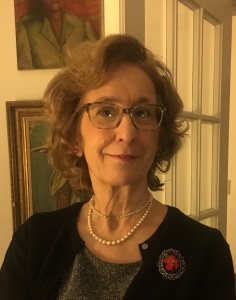
Volume 37, No. 1, Winter 2020
Kathleen Wickham is a professor in the School of Journalism and New Media at the University of Mississippi. In an interview with Editorial Assistant Ashley Walter, she discusses her article about the award-winning documentary Eyes on the Prize, which was notable for its reliance on news footage and interviews with civil rights activists.
How did you first become interested in Henry Hampton and Eyes on the Prize?
I teach a seminar class titled Press and the South. We examine media coverage of civil rights activities between 1954 and 1965. I started using the series as part of the class, to bring incidents to life in the classroom. The documentary is a jumping off point to discuss media coverage across the South.
What was your experience like at the Film and Media Archive?
I spent a week at Washington University on a research fellowship. I went not knowing what I would find but decided to read everything I could. I had a sense that something interesting would materialize. As it turned out I discovered audio tapes from the pre-production school sessions. Archive staffers told me no one had published anything based on the tapes. I am a former journalist and finding the “other” was often what I used when developing investigative stories. (The “other” being what was missing, or what was new.) This was my “other” and it became the basis of my research.
What surprised you in interviewing your participants?
They were honest and open about the pre-production school experience, and willing to talk about their involvement on Eyes on the Prize. They all lead busy lives and I was not sure they would want to spent time talking about an event which occurred some 30 years earlier to a scholar from the South. I learned from them that the experience was a significant part of their professional lives, and they were proud of what the series accomplished as well as their participation.
You conclude your article by quoting Hampton on the power of television on the “American psyche.” Do you think that the same can be said of the internet and social media today?
Recent studies by the Pew Research Center show more people are getting most of their news from online sources rather than traditional legacy sources so yes, social media has power over what the public talks about. But I still support agenda-setting/framing theory in that the media does not have the power to tell people how to think. At the same time, the fact that there are more sources of news has led to information silos with readers less inclined to pursue information outside their current world-view. The impact on society is already being felt which may lead me to reluctantly abandon my support of agenda-setting as time goes on.
What are additional resources are available for people who would like to learn more about Henry Hampton and/or Eyes on the Prize?
Two seminal and invaluable books are Eyes on the Prize: America’s Civil Rights Years, 1954-1965 (1987, 2013) by Juan Williams and The Eyes on the Prize Civil Rights Reader: Documents, Speeches, and Firsthand Accounts from the Black Freedom Struggle (1991) edited by Clayborne Carson. These are “old books” but are available online. Jon Else’s True South: Henry Hampton and “Eyes on the Prize,” the Landmark Television Series That Reframed the Civil Rights Movement (2017) is a valuable, more current resource. American Experience on PBS has transcripts and instructional tools at http://www.shoppbs.pbs.org/wgbh/amex/eyesontheprize/about/fd.html
Archive staffers also told me most researchers focus on documentary techniques in the production. There is still much to be learned in that category. I just finished producing a Faulkner documentary, Thinking of Home: Falkner (sic) House & Rowan Oak. My experience reading everything in the Hampton file, including out-takes and cut files, and critically watching the videos multiple times guided me in overseeing the production.
